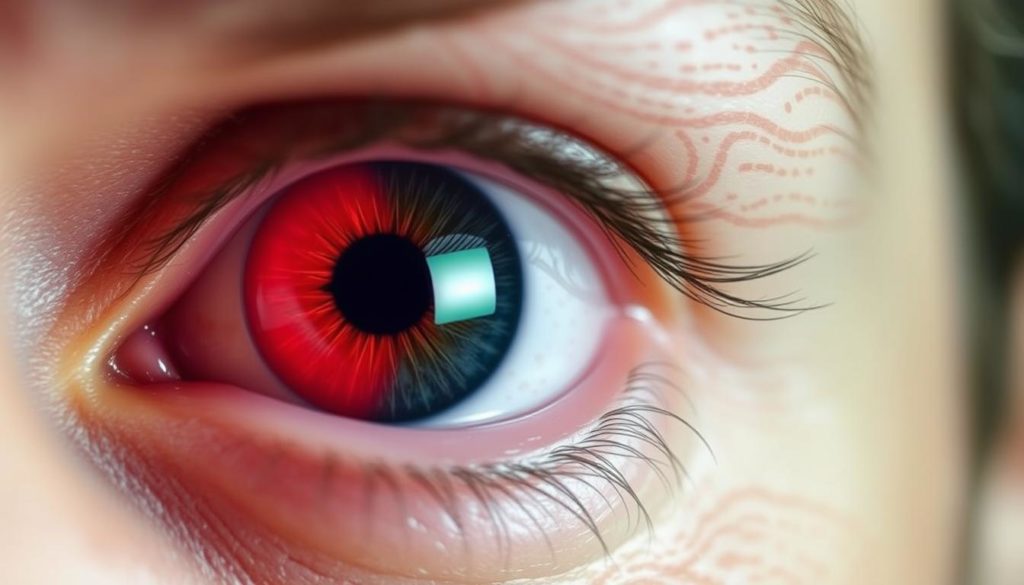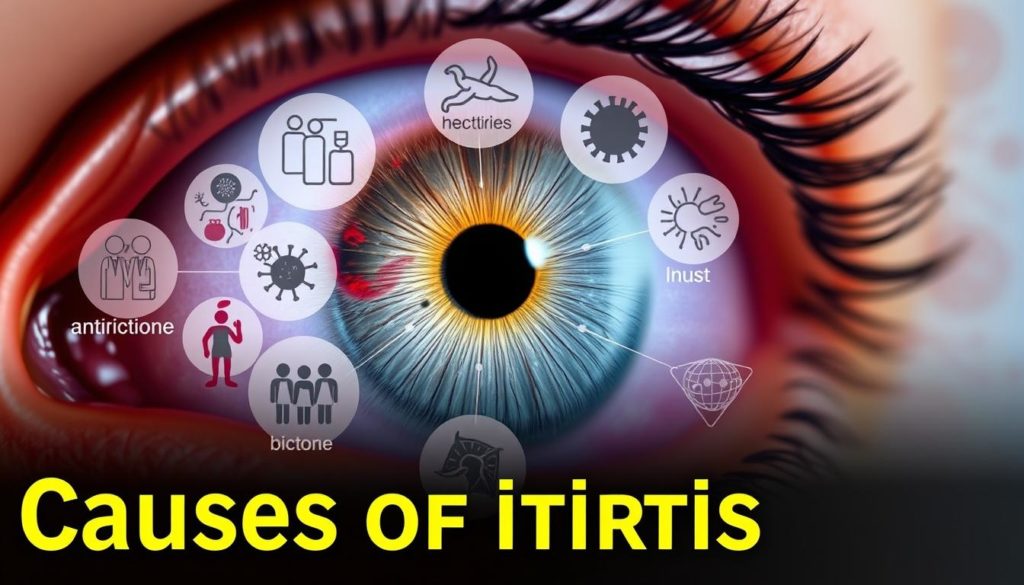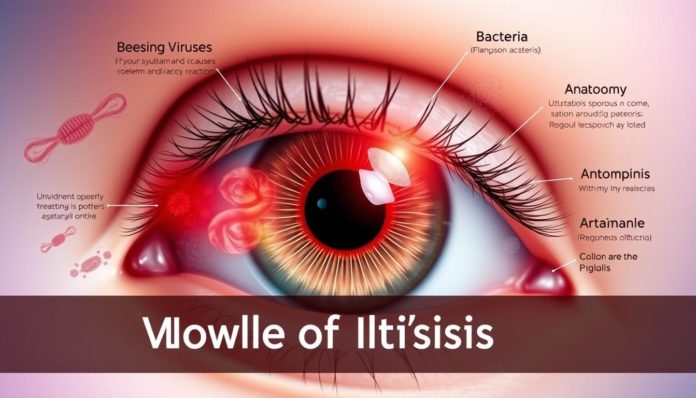“The eyes are the windows to the soul and the mind’s true mirror.” – William Shakespeare
Iritis is more than just a vision problem. It can also point to bigger health issues. In this iritis overview, we’ll explore what causes iritis, its symptoms, and treatment choices. Knowing about iritis helps you manage and possibly prevent it, keeping your eyes healthy.
Learning to spot iritis symptoms early and understanding iritis treatment options is key. This article is your guide for all things iritis. Whether you need medical advice or just want to learn more, we’ve got you covered.
What is Iritis?
Iritis, also known as anterior uveitis, is when the iris, the colored part of the eye, gets inflamed. Knowing what iritis is helps us understand and treat it properly.

Definition of Iritis
Iritis means the iris swells and gets irritated. This can make the eye red, painful, and light-sensitive. It can also blur your vision or cause dark spots, so seeing a doctor quickly is important.
Types of Iritis
Iritis can be divided into two main types: acute and chronic iritis.
- Acute Iritis – This type happens suddenly and can go away in three months with treatment. It causes a lot of eye pain, redness, and light sensitivity. Its quick start is very noticeable to the patient.
- Chronic Iritis – This type develops slowly and lasts for months or years. It causes long-term discomfort and can flare up again. If not treated, it might lead to serious problems like glaucoma or cataracts.
Iritis Overview
Iritis, also known as anterior uveitis, is an inflammation of the iris—the colored part of the eye. Knowing the causes of iritis is key for those with symptoms. It’s important to treat it well to avoid serious eye problems.
Inflammation in iritis can come from infections, autoimmune diseases, or trauma. Common causes of iritis include ankylosing spondylitis, rheumatoid arthritis, and viral infections. If not treated, it can cause glaucoma, cataracts, or even vision loss.

Managing iritis means regular check-ups and quick action when symptoms get worse. Treatment often includes eye drops or pills to reduce inflammation and pain. It’s also important to follow up regularly and make lifestyle changes to prevent it from coming back.
Here’s a comparison of iritis causes and complications:
| Causes of Iritis | Iritis Complications |
|---|---|
| Bacterial or viral infections | Glaucoma |
| Autoimmune diseases | Cataracts |
| Trauma | Vision loss |
Knowing how iritis causes and complications are linked helps patients spot early signs and get treatment fast. Good management is crucial to keep your eyes healthy and avoid lasting damage. Stay informed and proactive to get the best results.
Iritis Symptoms
Iritis can cause a range of symptoms that are uncomfortable and worrying. Spotting these symptoms early is crucial for a quick iritis diagnosis. It also helps avoid more serious problems.
Common Symptoms
Here are the common signs of iritis:
- Persistent eye pain that may be severe.
- Noticeable iritis redness around the iris.
- Increased sensitivity to light, causing discomfort.
- Blurred vision or difficulty seeing clearly.
When to See a Doctor
If you notice any of these symptoms, see a doctor right away. A quick iritis diagnosis from a professional is essential. It helps manage the condition and prevents serious issues like vision loss or chronic inflammation.
Don’t wait if symptoms get worse or don’t get better with home remedies. Early treatment is crucial.
Causes of Iritis
Iritis is an inflammation of the iris. It can come from many sources. Knowing these causes can help manage and prevent it.
Underlying Conditions
Autoimmune disorders like rheumatoid arthritis and lupus cause iritis. When the immune system attacks the body, it can also affect the eyes. Inflammatory bowel disease, especially Crohn’s disease and ulcerative colitis, can also lead to iritis.
Genetic Factors
Genetics play a big role in getting iritis. The HLA-B27 marker is often linked to it. People with this marker might get iritis more often. It’s key to know about genetic risks early.
Environmental Triggers
Eye trauma, like a blow to the eye, can cause iritis. Environmental allergens and toxins can also start inflammation in the iris. Not wearing eye protection against UV rays can add to the risk.
Iritis Diagnosis
Getting a correct diagnosis for iritis is key to treating it well and avoiding problems. It involves several steps and talks with eye care experts.
Diagnostic Procedures
The slit-lamp examination is a main tool for finding iritis. An ophthalmologist uses a special microscope to look at the eye. They check the front and back parts of the eye. This helps spot inflammation and other issues, leading to a right diagnosis.
- Fundoscopy – used to examine the interior surface of the eye.
- Visual Acuity Test – to determine the clarity of vision.
- Blood Tests – to identify underlying systemic conditions.
- Imaging – such as MRI or CT scans for detailed eye and orbit structures.
Specialist Consultations
Talking to an ophthalmologist or other eye experts is very important. They know how to read test results and plan the best treatment.
| Consultation Type | Purpose | Benefits |
|---|---|---|
| Ophthalmologist | Comprehensive eye exam, treatment plan | Expertise in eye diseases |
| Rheumatologist | Identify autoimmune causes | Specialized in systemic conditions |
| General Practitioner | Initial consultation, referrals | Whole-body health perspective |
In summary, quick visits to specialists can help avoid serious problems with iritis. They help patients find the best ways to manage their condition.
Iritis Treatment Options
Treating iritis well needs a plan that fits each person’s needs and health history. Knowing the options helps manage iritis better and reduce inflammation.
Medications
Corticosteroid eye drops are a key treatment for iritis. They help lower inflammation and prevent more problems. Sometimes, oral steroids or other drugs are needed for severe cases. The right medicine at the right time is crucial for managing iritis.
Home Remedies
Home remedies can help too. Cold compresses can soothe the eyes, and keeping eyes clean can stop irritation. Always talk to a doctor before trying home remedies.
Prevention Strategies
Stopping iritis from coming back is key for eye health. Regular eye exams, especially for those with autoimmune diseases, can spot inflammation early. Wearing protective eyewear and eating anti-inflammatory foods also help. With these steps, managing iritis and reducing inflammation is possible.
Complications of Iritis
Untreated or chronic iritis can lead to serious complications. These can affect your eye health and vision. It’s crucial to manage it correctly to avoid long-term damage.
Potential Risks
One major risk is the development of cataracts. Cataracts cloud the lens of the eye, causing blurry vision. In severe cases, it can lead to significant vision loss.
Another risk is glaucoma. Glaucoma increases eye pressure, damaging the optic nerve. If not treated quickly, it can cause permanent vision loss.
Long-Term Effects
Chronic iritis can cause severe vision loss if not treated. Prolonged inflammation can damage eye structures. This can impair vision quality over time.
So, it’s important to follow prescribed treatments and see an eye care specialist regularly. This helps monitor the condition and prevent these long-term effects.
Managing Iritis
Managing iritis means making lifestyle changes and seeing your doctor regularly. This keeps your eyes healthy. A holistic approach helps reduce iritis’s impact on your daily life.
Lifestyle Changes
Living a healthy lifestyle is key in managing iritis. Eat a balanced diet full of vitamins and antioxidants. Stay active and drink plenty of water. Managing stress is also crucial, as it can make symptoms worse.
- Maintain a balanced diet
- Engage in regular physical activity
- Practice stress management techniques
Adding these habits to your daily life can greatly improve your health. It also helps manage iritis symptoms better.
Follow-up Care
Regular eye exams are essential for iritis management. They help catch any changes or problems early. Working with your ophthalmologist ensures your treatment fits your needs.
These visits are a chance to talk about symptoms or concerns. You can also adjust medications and discuss lifestyle changes. Being proactive with your eye health can prevent more problems and make life more comfortable.
Iritis Prevention
Preventing iritis requires a few key steps. First, understanding the risk factors is important. This includes knowing about autoimmune disorders, infections, and genetic predispositions. By being aware of these, you can take steps to lower your risk.
Wearing protective eyewear is another crucial step. This is especially true for activities that could harm your eyes, like construction or sports. Reducing screen time and taking breaks can also help prevent eye strain. Using anti-glare screens and following the 20-20-20 rule are simple ways to protect your eyes.
Living a healthy lifestyle is also vital. Eating foods rich in vitamins A, C, and E is good for your eyes. Drinking plenty of water and getting regular eye exams are also important. By following these tips, you can help prevent iritis and keep your vision healthy.
FAQ
What is iritis?
Iritis is when the iris, the colored part of your eye, gets inflamed. It can cause eye pain, redness, and blurry vision.
What are the symptoms of iritis?
Symptoms include eye redness, pain, blurry vision, and light sensitivity. Seeing a doctor is key if you notice these signs.
What causes iritis?
Causes include autoimmune disorders, genetics, and environmental factors like trauma or toxins.
How is iritis diagnosed?
A slit-lamp exam by an ophthalmologist is used for diagnosis. Specialist consultations help confirm the diagnosis.
What are the treatment options for iritis?
Treatments include corticosteroid eye drops and home remedies. Prevention strategies also help manage inflammation.
Can iritis lead to complications?
Yes, untreated iritis can cause cataracts, glaucoma, and vision loss. Effective management is crucial.
How can iritis be managed long-term?
Long-term management involves lifestyle changes, regular care, and stress management. Eye check-ups and a healthy lifestyle are essential.
Are there ways to prevent iritis?
Preventing iritis involves understanding risk factors, protecting your eyes, and maintaining eye health habits.


